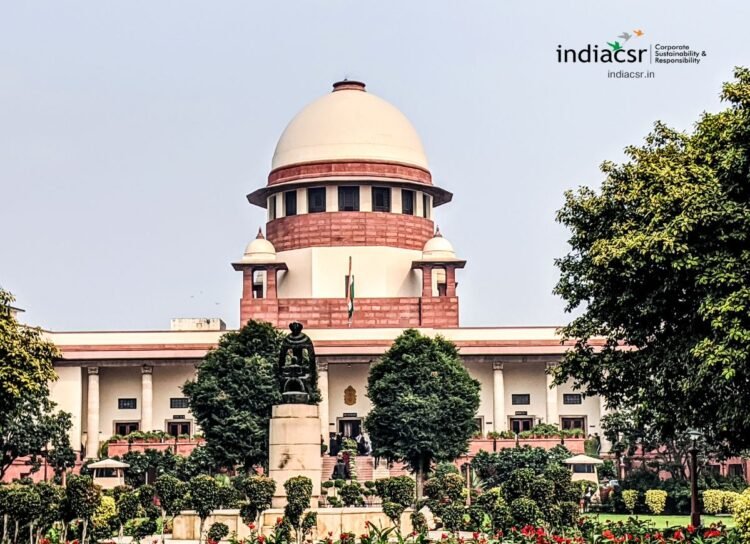The Supreme Court of India stayed the release of Wing Commander Niketa Pandey, a distinguished officer of the Indian Air Force (IAF) who played a pivotal role in critical operations such as Operation Sindoor and Operation Balakot. This ruling comes as a significant relief for Pandey, who was denied permanent commission despite her exemplary service, and underscores the ongoing struggle for gender equality and fair career prospects for women in the military.
Who is Wing Commander Niketa Pandey?
Wing Commander Niketa Pandey is an accomplished officer in the Indian Air Force who joined through the Short Service Commission (SSC) route in 2011. Over her 13.5 years of service, she has distinguished herself as a fighter controller, a role that requires exceptional strategic skills and coordination. Her contributions extend to critical military operations, including Operation Sindoor and Operation Balakot, where her expertise proved invaluable. Pandey’s dedication and merit have earned her high regard within the force, making her a standout officer in a male-dominated field. She ranks second in the merit list for expert fighter controllers in the country, showcasing her exceptional capabilities.
| Detail | Information |
|---|---|
| Case | Wing Commander Niketa Pandey’s plea for stay on release from IAF |
| Entry into IAF | Joined via Short Service Commission (SSC) in 2011 |
| Service Extension | Extended till June 19, 2025, after 10 years of service, on merit |
| Role | Played a crucial role in Operation Sindoor and Operation Balakot |
| Supreme Court Action | Stayed release on May 23, 2025, first SSC officer from IAF to get stay |
| Previous Similar Orders | Stayed release of over 50 Army women SSC officers on May 9, 2025, for PC consideration |
| Bench | Headed by Justice Surya Kant, also comprising Justice N Kotiswar Singh |
| ASG Representation | Aishwarya Bhati for Centre and IAF |
| Petitioner’s Legal Team | Senior advocate Menaka Guruswamy, advocate Astha Sharma |
| IAF’s Stance | Officer considered by two selection boards, found unsuitable; needs young officers |
| Policy Suggestion by Court | Consider policy for all SSC officers to get PC, subject to criteria, to reduce uncertainty and competition |
| Petitioner’s Argument | Denial of PC based on gender violates equality, despite 30+ years of women in IAF since 1992; limited to SSC unlike male counterparts |
| Training and Selection | Underwent extensive training as Fighter Controller, appeared before two Boards, one more chance for third and last Board |
| Concern | Apprehension of hasty third Board, not getting fair opportunity for PC |
The Role in Operation Sindoor and Operation Balakot
Operation Sindoor and Operation Balakot are two of the most significant military operations undertaken by the Indian Air Force in recent years. Operation Balakot, conducted in 2019, was a retaliatory airstrike against terrorist camps in Pakistan following the Pulwama attack. Operation Sindoor, while less publicized, was equally crucial, involving strategic air defense maneuvers. Wing Commander Pandey’s role as a fighter controller during these operations highlights her critical contribution to their success, showcasing her ability to handle high-pressure situations with precision and professionalism. Her work in the Integrated Air Command and Control Systems (IACCS) was instrumental during both operations.
The Issue of Permanent Commission Denial
Despite her stellar service record, Wing Commander Pandey faced a significant setback when she was denied permanent commission (PC) in the IAF. Under the current policy, women officers are primarily inducted through the SSC route, which limits their service to an initial 10-year tenure, with limited opportunities for extension. In contrast, male officers have the option to choose between SSC and permanent commission from the outset. This disparity has been a point of contention, as it restricts women’s long-term career prospects in the military.
Pandey’s case gained attention when she was granted an extension until June 19, 2025, after completing her initial 10-year tenure. However, the denial of permanent commission left her future uncertain, prompting her to seek legal recourse. Her petition argued that the lack of permanent commission opportunities for women officers, despite their proven capabilities, amounts to discrimination and violates principles of equality. She noted that women have been serving in the IAF since 1992, yet they are still restricted to SSC roles, unlike their male counterparts.
Supreme Court’s Decision
On May 23, 2025, the Supreme Court, led by a bench comprising Justices Surya Kant and N Kotiswar Singh, stayed Wing Commander Pandey’s release from service, directing the Centre and the IAF not to release her until further orders. This makes her the first IAF SSC officer to receive such relief from the court. The bench emphasized that the uncertainty faced by officers like Pandey regarding their long-term career prospects is detrimental to the armed forces. Justice Surya Kant remarked, “Our Air Force is one of the best organizations in the world. Officers are very commendable. They are a big asset for the nation. They are the nation, in a way. Because of them, we are able to sleep at night”.
The court also suggested that the Centre and the IAF consider revising their policy to align the intake of SSC officers with the availability of permanent commission opportunities. This, they noted, would reduce inter-se competition and heartburn among officers. The bench further observed that a “tough life” for SSC officers begins upon recruitment, and they deserve incentives, such as the opportunity for permanent commission, after 10 or 15 years of service. The matter is scheduled for further hearing on August 6, 2025.
Broader Implications for Women in the Military
Wing Commander Pandey’s case is not an isolated incident. It reflects a larger issue of gender disparity in the Indian armed forces. Women officers have been serving in the IAF since 1992, yet they continue to face limitations in career progression compared to their male counterparts. The Supreme Court’s decision to stay Pandey’s release is a step toward addressing these disparities, signaling a need for more inclusive and equitable policies.
Notably, this ruling follows a similar intervention by the Supreme Court on May 9, 2025, when it stayed the release of over 50 women SSC officers in the Indian Army to allow them consideration for permanent commission. These developments indicate a growing judicial recognition of the need to rectify systemic biases within the military. The court’s suggestion for a policy overhaul could pave the way for systemic changes, ensuring that women officers have equal opportunities to serve long-term in the armed forces.
Background of the Case
Wing Commander Pandey’s legal battle was spearheaded by senior advocate Menaka Guruswamy and advocate Astha Sharma. In her plea, Pandey highlighted that despite being selected for critical operations like Operation Sindoor due to her strategic skills and experience, she was denied permanent commission. She argued that this denial was based on gender, as male officers have the option of permanent commission from the start, while women are restricted to SSC.
Pandey also pointed out that she has undergone extensive training as a Fighter Controller and has appeared before two selection boards for permanent commission, with one final opportunity pending. However, there were concerns that the third board might not provide her with a fair chance, given the haste in which it was being convened. The IAF, represented by Additional Solicitor General Aishwarya Bhati, maintained that Pandey had been considered by two selection boards and found unsuitable for permanent commission. They also argued that the force requires younger officers, which influenced their decision. However, the Supreme Court’s intervention has temporarily halted her release, allowing for further deliberation on her case.
You Learn: A Step Toward Equality
The Supreme Court’s stay on Wing Commander Niketa Pandey’s release is a significant victory, not just for her but for all women officers in the IAF. It underscores the need for policies that recognize and reward the contributions of women in the military, ensuring they have equal opportunities for career advancement. As the court suggested, a revised policy that aligns SSC intake with permanent commission opportunities could go a long way in reducing uncertainty and fostering a more inclusive environment within the armed forces.
This case serves as a reminder of the ongoing struggle for gender equality in traditionally male-dominated fields like the military. It also highlights the judiciary’s role in championing fairness and justice, even in matters of national security and defense. As the case progresses, it will likely set a precedent for future policy changes, benefiting countless women officers who aspire to serve their country with distinction.






















